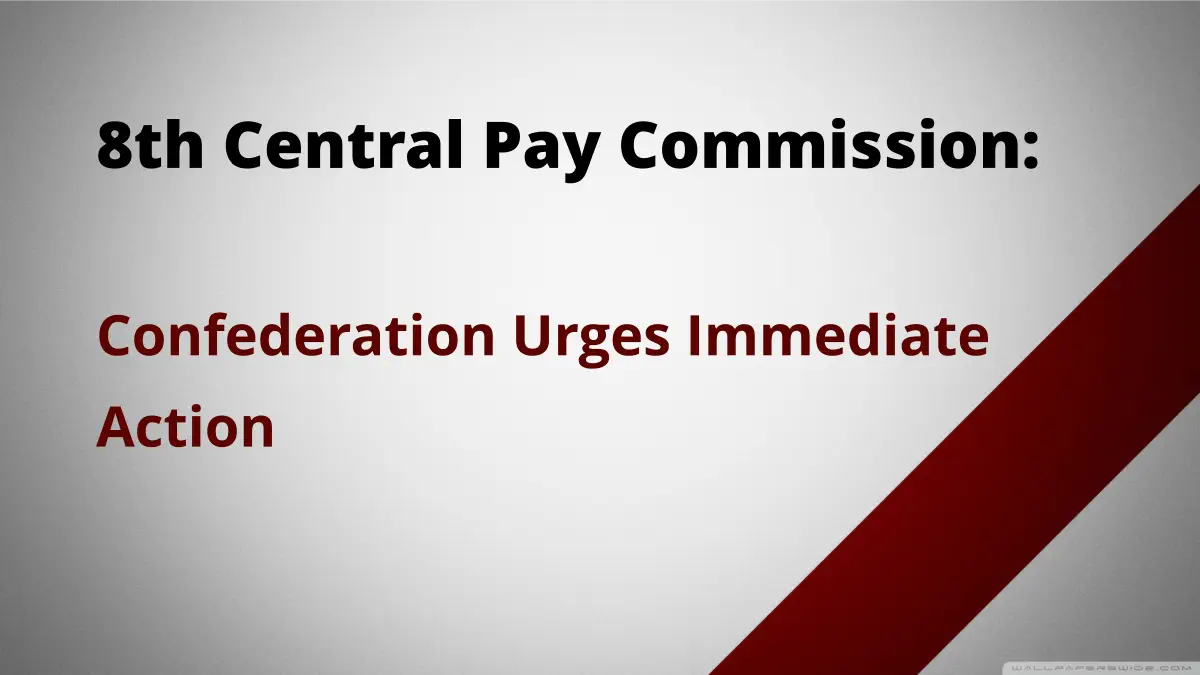Demand for 8th Central Pay Commission: Confederation Makes a Strong Appeal to PM

The Confederation of Central Government Employees and Workers, representing over 7 lakh Central Government employees across various departments, has submitted a formal request to the Prime Minister on December 11, 2024, urging the immediate constitution of the 8th Central Pay Commission (CPC).
The Confederation emphasized the critical need for a wage revision, citing factors like rising inflation, erosion of real wages, post-pandemic economic challenges, and the increasing cost of living. The request, accompanied by a detailed note, underlines the necessity for timely intervention to address employee welfare and ensure effective governance.
Key Highlights of the Confederation’s Letter
- Long Gap Since the Last Revision
- The 7th Central Pay Commission implemented wage revisions effective January 1, 2016.
- As of July 1, 2024, the Dearness Allowance (DA) entitlement has crossed 53%, highlighting the steep rise in inflation over the last nine years.
- Despite growing economic challenges, employees have had to endure a 10-year wage revision cycle.
- Significant Erosion of Real Wages
- The COVID-19 pandemic exacerbated the economic strain, with prices of both essential and non-essential commodities surging sharply.
- High inflation rates, averaging 5.5%, have reduced the purchasing power of salaries, leaving employees struggling to maintain a decent standard of living.
- Comparisons with Other Sectors
- Public Sector Units (PSUs) and bank employees receive wage revisions every five years.
- Central Government employees, however, face a 10-year cycle, which is increasingly unsustainable given the economic pressures.
- Doubling of Household Expenditure
- According to NSSO data, per capita monthly household consumption expenditure has more than doubled from 2011-12 to 2022-23, driven by inflation and rising living costs.
- While expenses have soared, wage growth has not kept pace, leading to financial stress for employees and pensioners.
- India’s Growing Economic Strength
- The Confederation noted that India is poised to become the third-largest economy globally by 2027, surpassing Japan and Germany, with GDP projected to exceed $5 trillion.
- Given this strong economic outlook, the government is well-positioned to ensure fair and timely wage revisions.
- Social Responsibility of the Government
- As a model employer, the Government of India has a duty to provide a comfortable living standard for its workforce.
- Employees play a pivotal role in implementing government programs and policies, ensuring benefits reach the common man.
- Importance of Attracting Talent
- A competitive pay structure is essential to attract and retain the best talent in government service.
- The Confederation stressed that talented employees are crucial for delivering good leadership and effective governance.
Key Insights from the Detailed Note
The detailed note enclosed with the Confederation’s letter further expanded on the economic and social arguments:
- Impact of Inflation on Wages
- Over the past decade, inflation has steadily eroded the real value of wages, disproportionately impacting employees and pensioners.
- Employees now struggle to maintain basic living standards, with rising prices of goods, services, and housing adding to their burden.
- Wage Parity with PSUs and Banks
- The Confederation highlighted that wage revisions in PSUs and banks occur every five years to align with inflation.
- Central Government employees, however, are subject to a 10-year wage revision cycle, which fails to address economic realities.
- Living Wages and Economic Responsibility
- The Confederation emphasized that employees deserve a living wage that reflects the current economic conditions.
- A revised pay structure would not only improve living standards but also boost morale and productivity.
- Employee Expectations and Trust
- Citing observations from the Supreme Court, the Confederation reminded the government that employees’ legitimate aspirations must not be disregarded.
- A fair and timely wage revision fosters trust and ensures that employees feel valued.
- The Role of Central Government Employees
- Employees form the backbone of the government, implementing policies and delivering services to the public.
- Ensuring their financial well-being is critical for achieving good governance and effective policy execution.
Confederation’s Call for Immediate Action
The Confederation concluded its plea with a clear demand:
- Constitute the 8th Central Pay Commission without further delay to address the wage erosion caused by inflation and rising costs.
- Act swiftly to ensure Central Government employees and pensioners receive fair compensation and are empowered to work effectively.
India’s Economic Context and Paying Capacity
The note also pointed to India’s strong economic performance, highlighting:
- IMF projections indicating India’s ascent to the world’s third-largest economy.
- The government’s paying capacity is more than adequate to meet employee expectations, especially in light of economic growth.
View the Confederation’s letter:
 Loading…
Loading…




